Company Law (LAW610) Assignment: Mainzeal Directors' Duties Essay
VerifiedAdded on 2022/11/22
|8
|1839
|88
Essay
AI Summary
This essay provides a critical evaluation of the High Court judgment against the directors of Mainzeal Construction, focusing on the breaches of their duties. It examines the directors' actions, which were deemed reckless, dishonest, and self-interested, and how these actions reflect on New Zealand's standards of corporate governance. The essay delves into the significance of the case as a reminder to directors that company law mandates prioritizing creditor interests over those of shareholders. It further explores the implications of personal liability for losses incurred by creditors due to poor business decisions, as highlighted in the Mainzeal case. The analysis incorporates relevant sections of the Companies Act 1993 and corporate governance principles in New Zealand, as well as discussing the importance of risk management and reporting and disclosures. The essay also explores the potential loopholes in the current corporate governance regime and suggests improvements to clarify directors' duties and penalties for breaches, particularly in the context of group companies. The importance of the Mainzeal case in setting a precedent for director liability and encouraging good corporate governance is also emphasized.
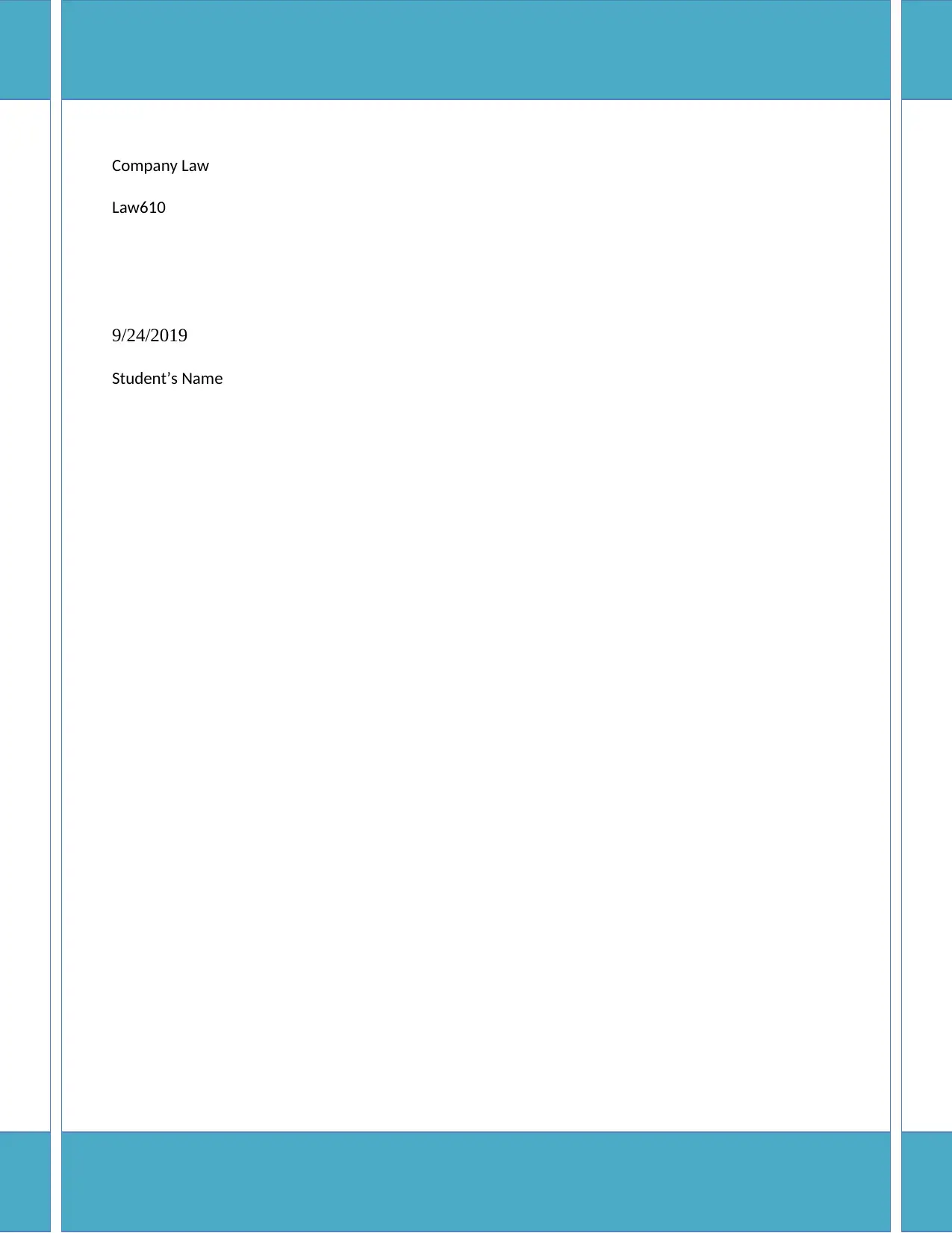
Running Head: BUSINESS AND CORPORATION LAW 0
Company Law
Law610
9/24/2019
Student’s Name
Company Law
Law610
9/24/2019
Student’s Name
Paraphrase This Document
Need a fresh take? Get an instant paraphrase of this document with our AI Paraphraser
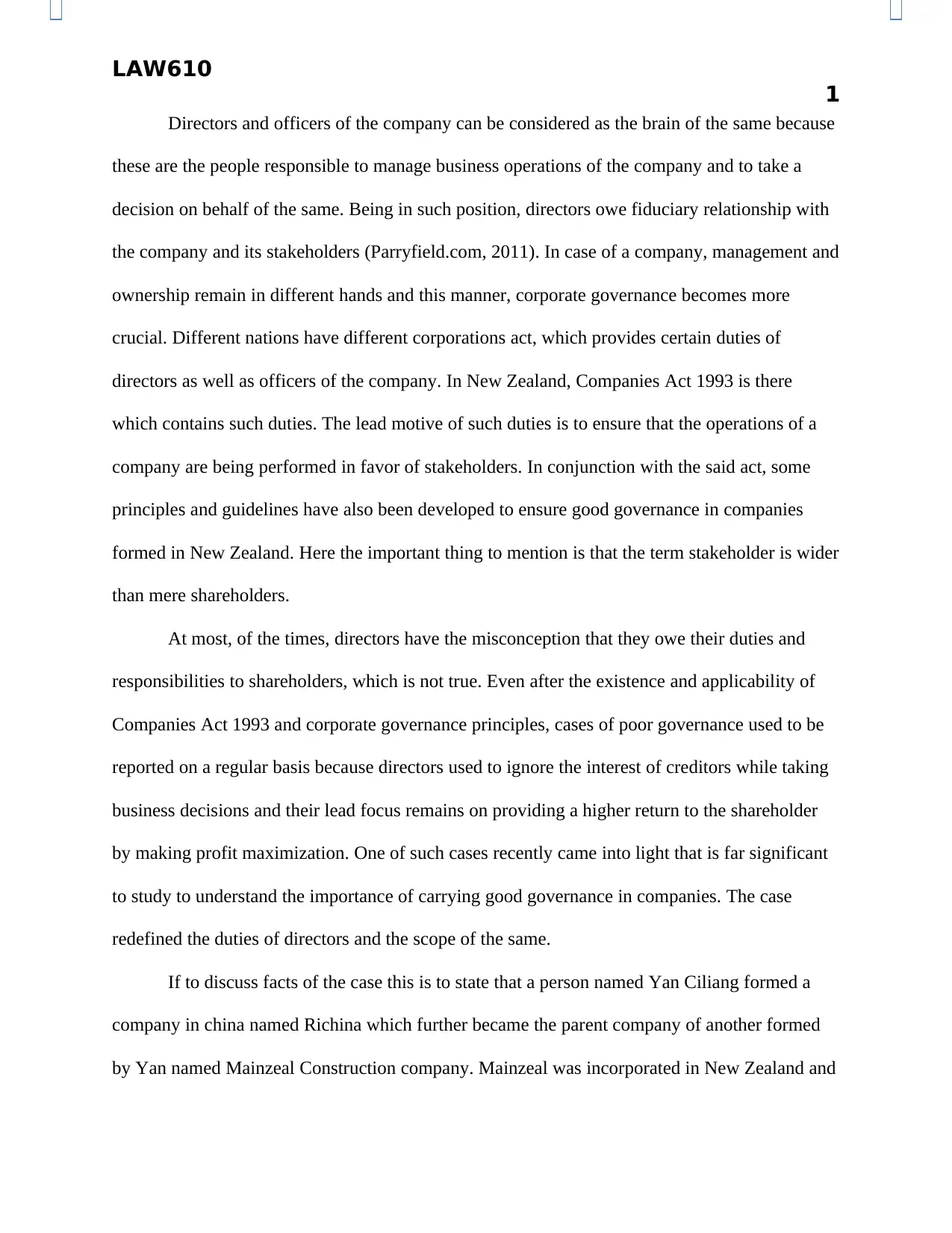
LAW610
1
Directors and officers of the company can be considered as the brain of the same because
these are the people responsible to manage business operations of the company and to take a
decision on behalf of the same. Being in such position, directors owe fiduciary relationship with
the company and its stakeholders (Parryfield.com, 2011). In case of a company, management and
ownership remain in different hands and this manner, corporate governance becomes more
crucial. Different nations have different corporations act, which provides certain duties of
directors as well as officers of the company. In New Zealand, Companies Act 1993 is there
which contains such duties. The lead motive of such duties is to ensure that the operations of a
company are being performed in favor of stakeholders. In conjunction with the said act, some
principles and guidelines have also been developed to ensure good governance in companies
formed in New Zealand. Here the important thing to mention is that the term stakeholder is wider
than mere shareholders.
At most, of the times, directors have the misconception that they owe their duties and
responsibilities to shareholders, which is not true. Even after the existence and applicability of
Companies Act 1993 and corporate governance principles, cases of poor governance used to be
reported on a regular basis because directors used to ignore the interest of creditors while taking
business decisions and their lead focus remains on providing a higher return to the shareholder
by making profit maximization. One of such cases recently came into light that is far significant
to study to understand the importance of carrying good governance in companies. The case
redefined the duties of directors and the scope of the same.
If to discuss facts of the case this is to state that a person named Yan Ciliang formed a
company in china named Richina which further became the parent company of another formed
by Yan named Mainzeal Construction company. Mainzeal was incorporated in New Zealand and
1
Directors and officers of the company can be considered as the brain of the same because
these are the people responsible to manage business operations of the company and to take a
decision on behalf of the same. Being in such position, directors owe fiduciary relationship with
the company and its stakeholders (Parryfield.com, 2011). In case of a company, management and
ownership remain in different hands and this manner, corporate governance becomes more
crucial. Different nations have different corporations act, which provides certain duties of
directors as well as officers of the company. In New Zealand, Companies Act 1993 is there
which contains such duties. The lead motive of such duties is to ensure that the operations of a
company are being performed in favor of stakeholders. In conjunction with the said act, some
principles and guidelines have also been developed to ensure good governance in companies
formed in New Zealand. Here the important thing to mention is that the term stakeholder is wider
than mere shareholders.
At most, of the times, directors have the misconception that they owe their duties and
responsibilities to shareholders, which is not true. Even after the existence and applicability of
Companies Act 1993 and corporate governance principles, cases of poor governance used to be
reported on a regular basis because directors used to ignore the interest of creditors while taking
business decisions and their lead focus remains on providing a higher return to the shareholder
by making profit maximization. One of such cases recently came into light that is far significant
to study to understand the importance of carrying good governance in companies. The case
redefined the duties of directors and the scope of the same.
If to discuss facts of the case this is to state that a person named Yan Ciliang formed a
company in china named Richina which further became the parent company of another formed
by Yan named Mainzeal Construction company. Mainzeal was incorporated in New Zealand and
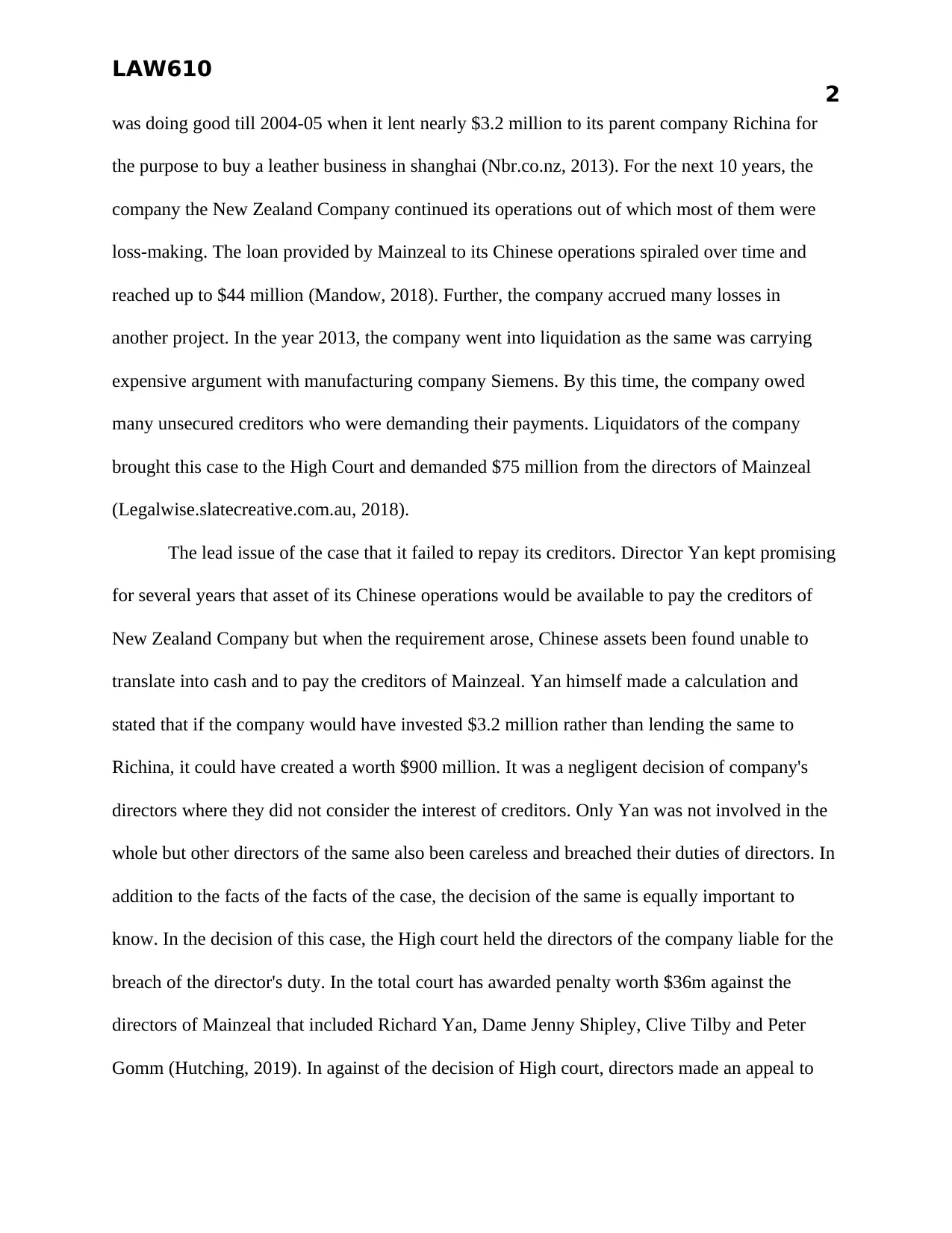
LAW610
2
was doing good till 2004-05 when it lent nearly $3.2 million to its parent company Richina for
the purpose to buy a leather business in shanghai (Nbr.co.nz, 2013). For the next 10 years, the
company the New Zealand Company continued its operations out of which most of them were
loss-making. The loan provided by Mainzeal to its Chinese operations spiraled over time and
reached up to $44 million (Mandow, 2018). Further, the company accrued many losses in
another project. In the year 2013, the company went into liquidation as the same was carrying
expensive argument with manufacturing company Siemens. By this time, the company owed
many unsecured creditors who were demanding their payments. Liquidators of the company
brought this case to the High Court and demanded $75 million from the directors of Mainzeal
(Legalwise.slatecreative.com.au, 2018).
The lead issue of the case that it failed to repay its creditors. Director Yan kept promising
for several years that asset of its Chinese operations would be available to pay the creditors of
New Zealand Company but when the requirement arose, Chinese assets been found unable to
translate into cash and to pay the creditors of Mainzeal. Yan himself made a calculation and
stated that if the company would have invested $3.2 million rather than lending the same to
Richina, it could have created a worth $900 million. It was a negligent decision of company's
directors where they did not consider the interest of creditors. Only Yan was not involved in the
whole but other directors of the same also been careless and breached their duties of directors. In
addition to the facts of the facts of the case, the decision of the same is equally important to
know. In the decision of this case, the High court held the directors of the company liable for the
breach of the director's duty. In the total court has awarded penalty worth $36m against the
directors of Mainzeal that included Richard Yan, Dame Jenny Shipley, Clive Tilby and Peter
Gomm (Hutching, 2019). In against of the decision of High court, directors made an appeal to
2
was doing good till 2004-05 when it lent nearly $3.2 million to its parent company Richina for
the purpose to buy a leather business in shanghai (Nbr.co.nz, 2013). For the next 10 years, the
company the New Zealand Company continued its operations out of which most of them were
loss-making. The loan provided by Mainzeal to its Chinese operations spiraled over time and
reached up to $44 million (Mandow, 2018). Further, the company accrued many losses in
another project. In the year 2013, the company went into liquidation as the same was carrying
expensive argument with manufacturing company Siemens. By this time, the company owed
many unsecured creditors who were demanding their payments. Liquidators of the company
brought this case to the High Court and demanded $75 million from the directors of Mainzeal
(Legalwise.slatecreative.com.au, 2018).
The lead issue of the case that it failed to repay its creditors. Director Yan kept promising
for several years that asset of its Chinese operations would be available to pay the creditors of
New Zealand Company but when the requirement arose, Chinese assets been found unable to
translate into cash and to pay the creditors of Mainzeal. Yan himself made a calculation and
stated that if the company would have invested $3.2 million rather than lending the same to
Richina, it could have created a worth $900 million. It was a negligent decision of company's
directors where they did not consider the interest of creditors. Only Yan was not involved in the
whole but other directors of the same also been careless and breached their duties of directors. In
addition to the facts of the facts of the case, the decision of the same is equally important to
know. In the decision of this case, the High court held the directors of the company liable for the
breach of the director's duty. In the total court has awarded penalty worth $36m against the
directors of Mainzeal that included Richard Yan, Dame Jenny Shipley, Clive Tilby and Peter
Gomm (Hutching, 2019). In against of the decision of High court, directors made an appeal to
⊘ This is a preview!⊘
Do you want full access?
Subscribe today to unlock all pages.

Trusted by 1+ million students worldwide
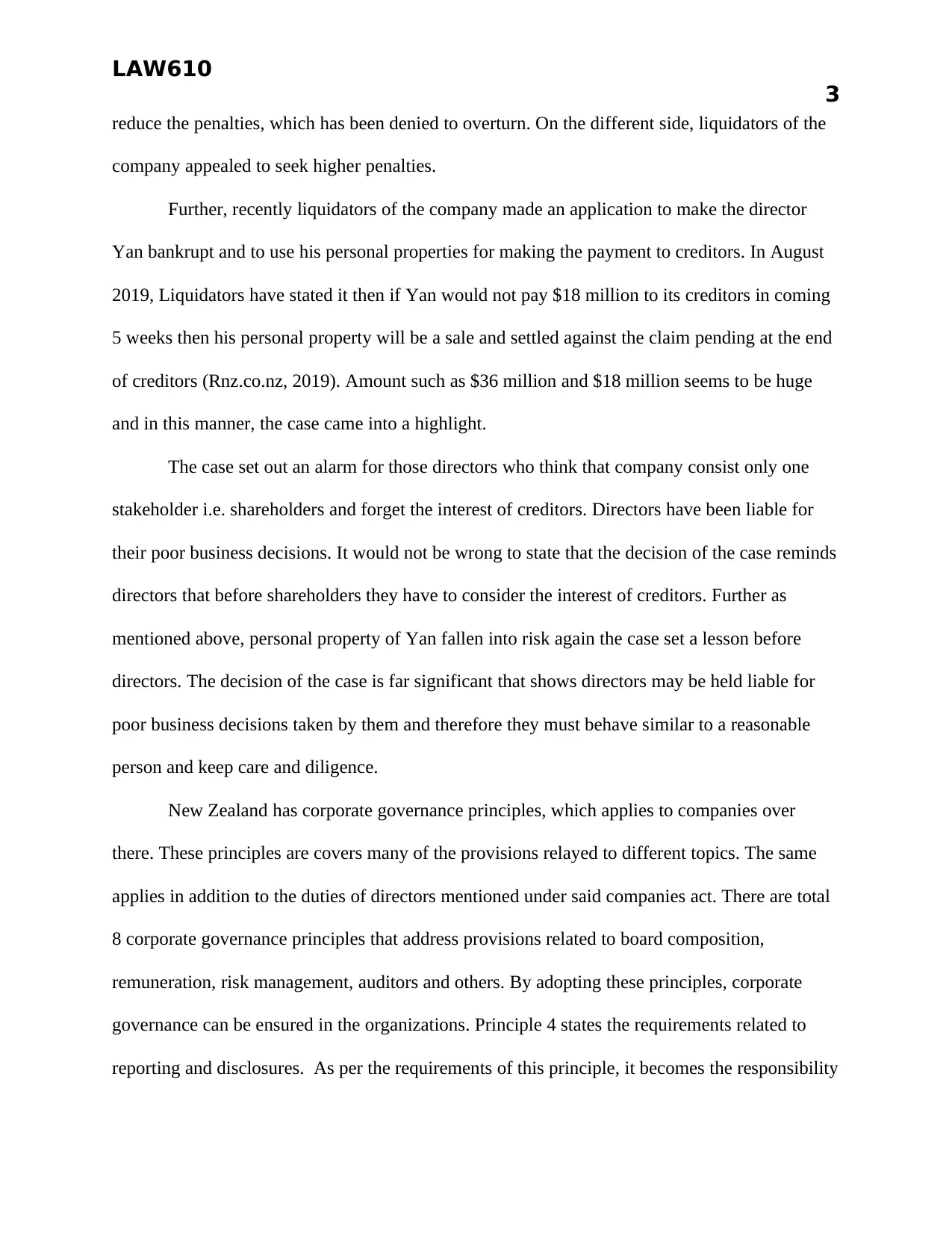
LAW610
3
reduce the penalties, which has been denied to overturn. On the different side, liquidators of the
company appealed to seek higher penalties.
Further, recently liquidators of the company made an application to make the director
Yan bankrupt and to use his personal properties for making the payment to creditors. In August
2019, Liquidators have stated it then if Yan would not pay $18 million to its creditors in coming
5 weeks then his personal property will be a sale and settled against the claim pending at the end
of creditors (Rnz.co.nz, 2019). Amount such as $36 million and $18 million seems to be huge
and in this manner, the case came into a highlight.
The case set out an alarm for those directors who think that company consist only one
stakeholder i.e. shareholders and forget the interest of creditors. Directors have been liable for
their poor business decisions. It would not be wrong to state that the decision of the case reminds
directors that before shareholders they have to consider the interest of creditors. Further as
mentioned above, personal property of Yan fallen into risk again the case set a lesson before
directors. The decision of the case is far significant that shows directors may be held liable for
poor business decisions taken by them and therefore they must behave similar to a reasonable
person and keep care and diligence.
New Zealand has corporate governance principles, which applies to companies over
there. These principles are covers many of the provisions relayed to different topics. The same
applies in addition to the duties of directors mentioned under said companies act. There are total
8 corporate governance principles that address provisions related to board composition,
remuneration, risk management, auditors and others. By adopting these principles, corporate
governance can be ensured in the organizations. Principle 4 states the requirements related to
reporting and disclosures. As per the requirements of this principle, it becomes the responsibility
3
reduce the penalties, which has been denied to overturn. On the different side, liquidators of the
company appealed to seek higher penalties.
Further, recently liquidators of the company made an application to make the director
Yan bankrupt and to use his personal properties for making the payment to creditors. In August
2019, Liquidators have stated it then if Yan would not pay $18 million to its creditors in coming
5 weeks then his personal property will be a sale and settled against the claim pending at the end
of creditors (Rnz.co.nz, 2019). Amount such as $36 million and $18 million seems to be huge
and in this manner, the case came into a highlight.
The case set out an alarm for those directors who think that company consist only one
stakeholder i.e. shareholders and forget the interest of creditors. Directors have been liable for
their poor business decisions. It would not be wrong to state that the decision of the case reminds
directors that before shareholders they have to consider the interest of creditors. Further as
mentioned above, personal property of Yan fallen into risk again the case set a lesson before
directors. The decision of the case is far significant that shows directors may be held liable for
poor business decisions taken by them and therefore they must behave similar to a reasonable
person and keep care and diligence.
New Zealand has corporate governance principles, which applies to companies over
there. These principles are covers many of the provisions relayed to different topics. The same
applies in addition to the duties of directors mentioned under said companies act. There are total
8 corporate governance principles that address provisions related to board composition,
remuneration, risk management, auditors and others. By adopting these principles, corporate
governance can be ensured in the organizations. Principle 4 states the requirements related to
reporting and disclosures. As per the requirements of this principle, it becomes the responsibility
Paraphrase This Document
Need a fresh take? Get an instant paraphrase of this document with our AI Paraphraser
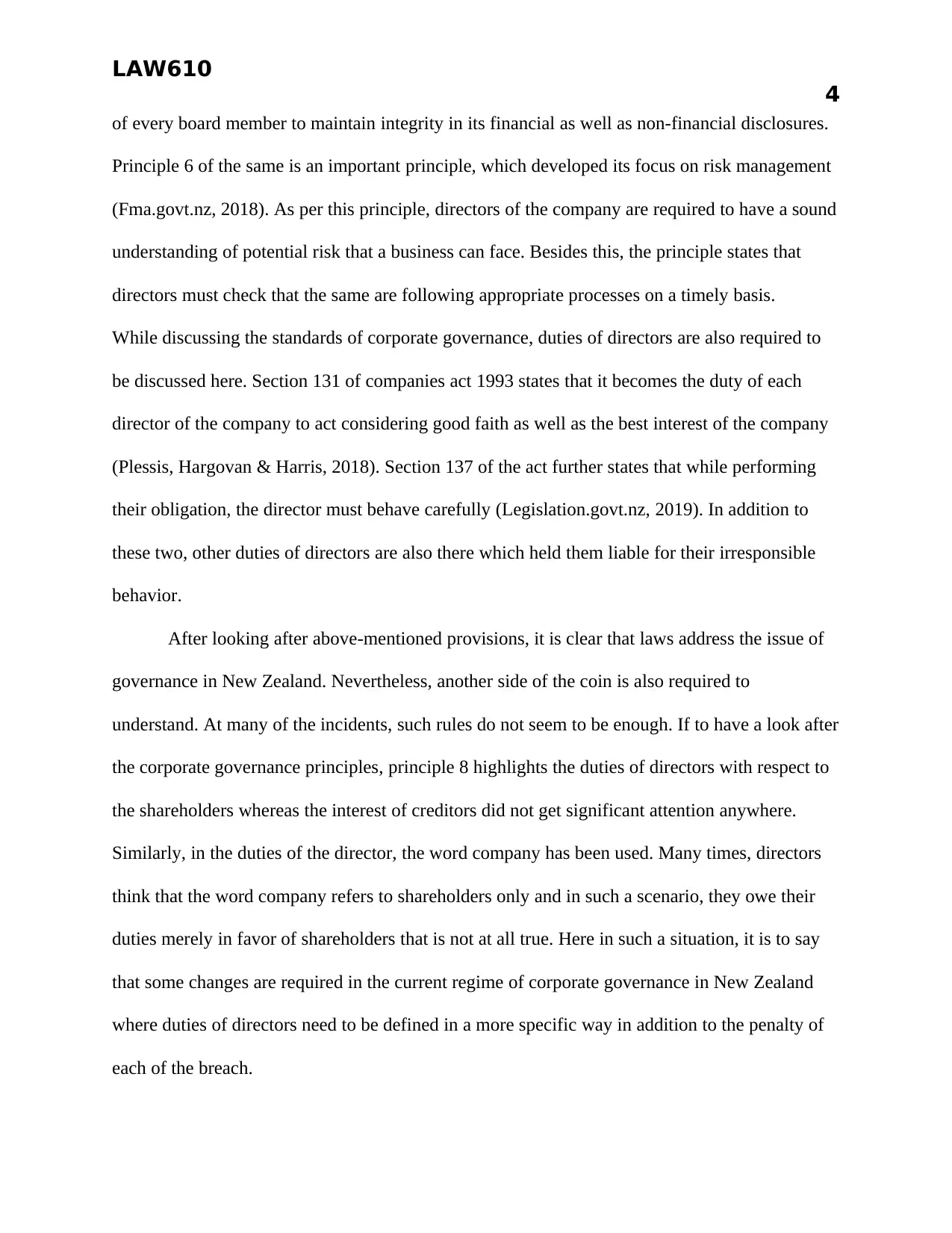
LAW610
4
of every board member to maintain integrity in its financial as well as non-financial disclosures.
Principle 6 of the same is an important principle, which developed its focus on risk management
(Fma.govt.nz, 2018). As per this principle, directors of the company are required to have a sound
understanding of potential risk that a business can face. Besides this, the principle states that
directors must check that the same are following appropriate processes on a timely basis.
While discussing the standards of corporate governance, duties of directors are also required to
be discussed here. Section 131 of companies act 1993 states that it becomes the duty of each
director of the company to act considering good faith as well as the best interest of the company
(Plessis, Hargovan & Harris, 2018). Section 137 of the act further states that while performing
their obligation, the director must behave carefully (Legislation.govt.nz, 2019). In addition to
these two, other duties of directors are also there which held them liable for their irresponsible
behavior.
After looking after above-mentioned provisions, it is clear that laws address the issue of
governance in New Zealand. Nevertheless, another side of the coin is also required to
understand. At many of the incidents, such rules do not seem to be enough. If to have a look after
the corporate governance principles, principle 8 highlights the duties of directors with respect to
the shareholders whereas the interest of creditors did not get significant attention anywhere.
Similarly, in the duties of the director, the word company has been used. Many times, directors
think that the word company refers to shareholders only and in such a scenario, they owe their
duties merely in favor of shareholders that is not at all true. Here in such a situation, it is to say
that some changes are required in the current regime of corporate governance in New Zealand
where duties of directors need to be defined in a more specific way in addition to the penalty of
each of the breach.
4
of every board member to maintain integrity in its financial as well as non-financial disclosures.
Principle 6 of the same is an important principle, which developed its focus on risk management
(Fma.govt.nz, 2018). As per this principle, directors of the company are required to have a sound
understanding of potential risk that a business can face. Besides this, the principle states that
directors must check that the same are following appropriate processes on a timely basis.
While discussing the standards of corporate governance, duties of directors are also required to
be discussed here. Section 131 of companies act 1993 states that it becomes the duty of each
director of the company to act considering good faith as well as the best interest of the company
(Plessis, Hargovan & Harris, 2018). Section 137 of the act further states that while performing
their obligation, the director must behave carefully (Legislation.govt.nz, 2019). In addition to
these two, other duties of directors are also there which held them liable for their irresponsible
behavior.
After looking after above-mentioned provisions, it is clear that laws address the issue of
governance in New Zealand. Nevertheless, another side of the coin is also required to
understand. At many of the incidents, such rules do not seem to be enough. If to have a look after
the corporate governance principles, principle 8 highlights the duties of directors with respect to
the shareholders whereas the interest of creditors did not get significant attention anywhere.
Similarly, in the duties of the director, the word company has been used. Many times, directors
think that the word company refers to shareholders only and in such a scenario, they owe their
duties merely in favor of shareholders that is not at all true. Here in such a situation, it is to say
that some changes are required in the current regime of corporate governance in New Zealand
where duties of directors need to be defined in a more specific way in addition to the penalty of
each of the breach.
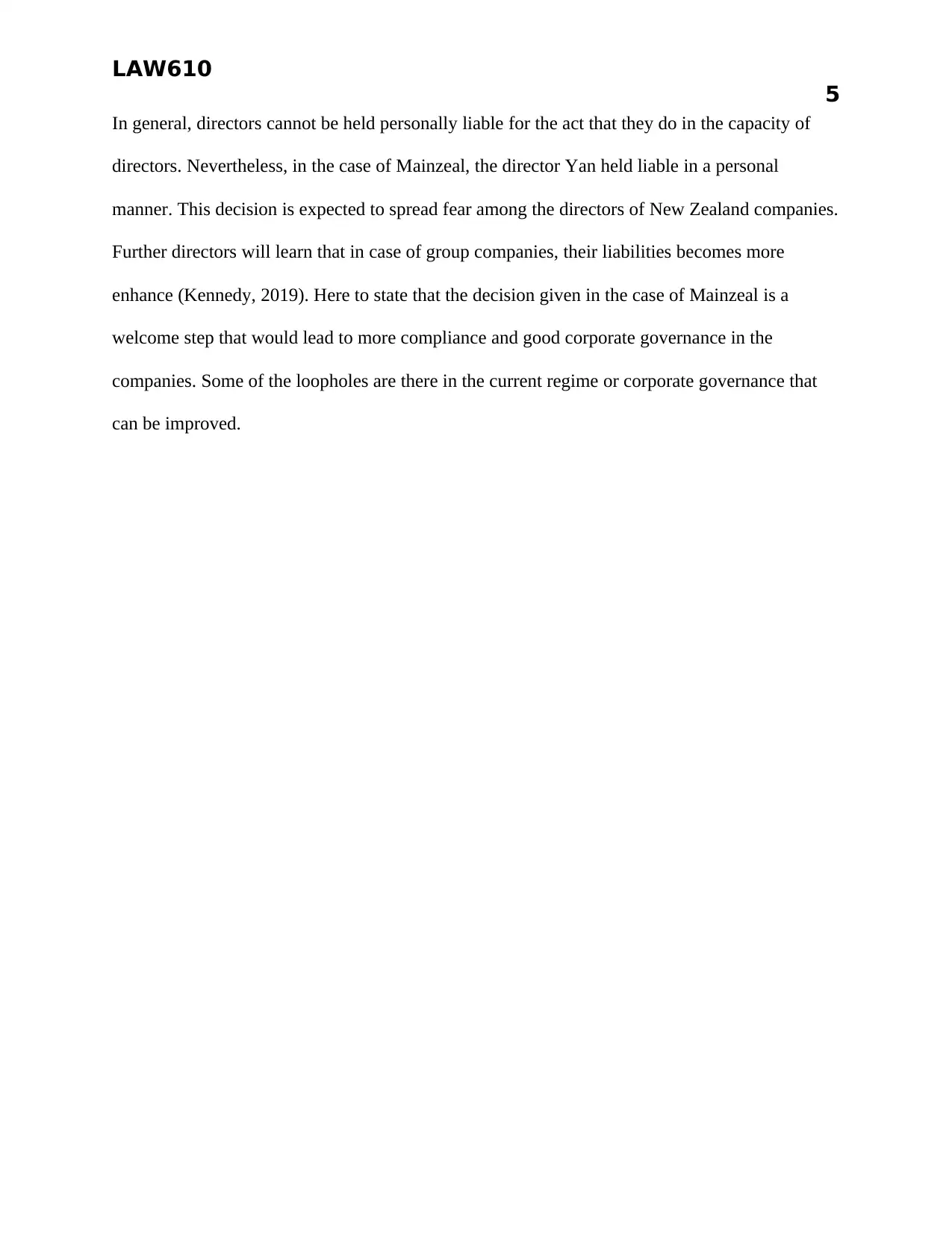
LAW610
5
In general, directors cannot be held personally liable for the act that they do in the capacity of
directors. Nevertheless, in the case of Mainzeal, the director Yan held liable in a personal
manner. This decision is expected to spread fear among the directors of New Zealand companies.
Further directors will learn that in case of group companies, their liabilities becomes more
enhance (Kennedy, 2019). Here to state that the decision given in the case of Mainzeal is a
welcome step that would lead to more compliance and good corporate governance in the
companies. Some of the loopholes are there in the current regime or corporate governance that
can be improved.
5
In general, directors cannot be held personally liable for the act that they do in the capacity of
directors. Nevertheless, in the case of Mainzeal, the director Yan held liable in a personal
manner. This decision is expected to spread fear among the directors of New Zealand companies.
Further directors will learn that in case of group companies, their liabilities becomes more
enhance (Kennedy, 2019). Here to state that the decision given in the case of Mainzeal is a
welcome step that would lead to more compliance and good corporate governance in the
companies. Some of the loopholes are there in the current regime or corporate governance that
can be improved.
⊘ This is a preview!⊘
Do you want full access?
Subscribe today to unlock all pages.

Trusted by 1+ million students worldwide
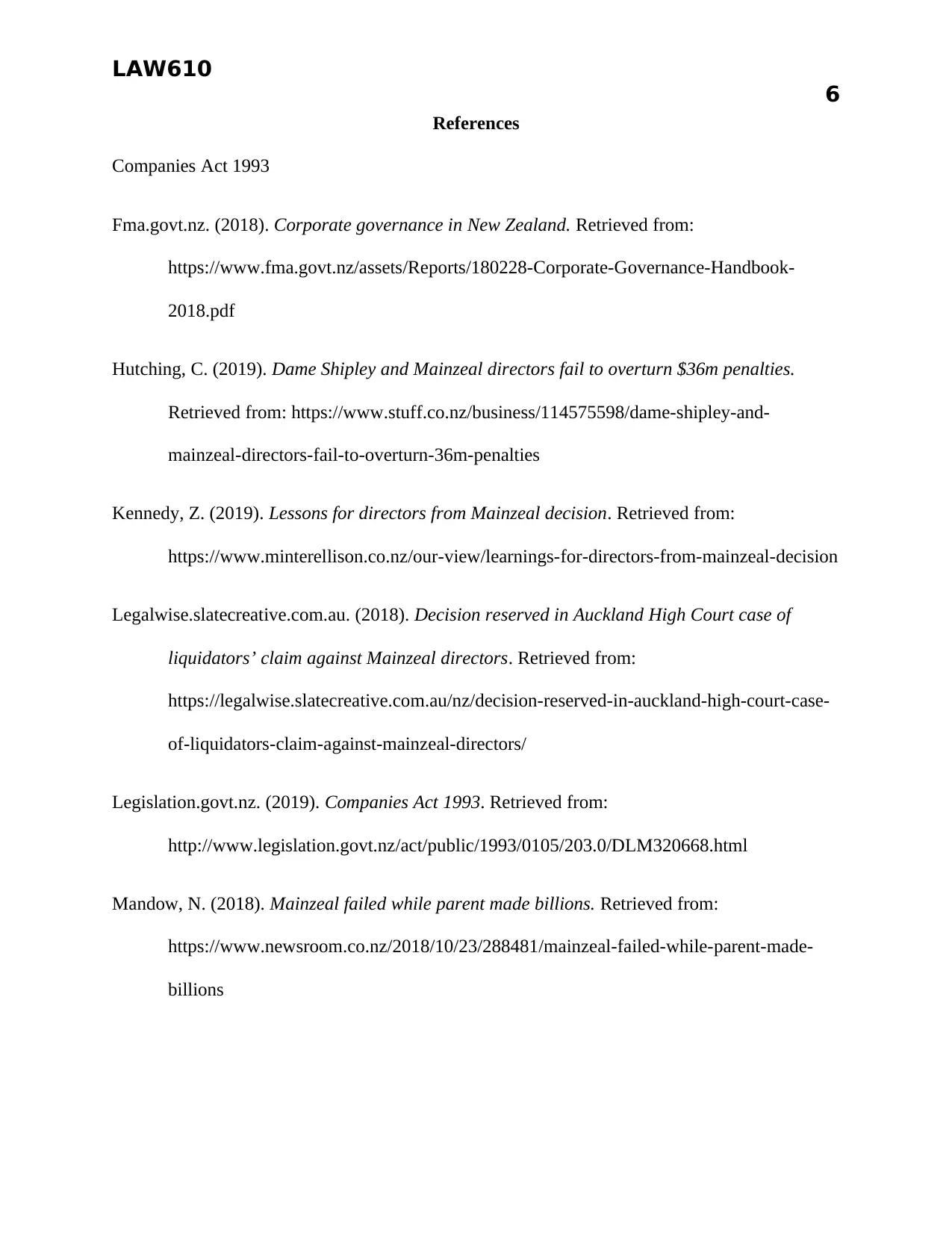
LAW610
6
References
Companies Act 1993
Fma.govt.nz. (2018). Corporate governance in New Zealand. Retrieved from:
https://www.fma.govt.nz/assets/Reports/180228-Corporate-Governance-Handbook-
2018.pdf
Hutching, C. (2019). Dame Shipley and Mainzeal directors fail to overturn $36m penalties.
Retrieved from: https://www.stuff.co.nz/business/114575598/dame-shipley-and-
mainzeal-directors-fail-to-overturn-36m-penalties
Kennedy, Z. (2019). Lessons for directors from Mainzeal decision. Retrieved from:
https://www.minterellison.co.nz/our-view/learnings-for-directors-from-mainzeal-decision
Legalwise.slatecreative.com.au. (2018). Decision reserved in Auckland High Court case of
liquidators’ claim against Mainzeal directors. Retrieved from:
https://legalwise.slatecreative.com.au/nz/decision-reserved-in-auckland-high-court-case-
of-liquidators-claim-against-mainzeal-directors/
Legislation.govt.nz. (2019). Companies Act 1993. Retrieved from:
http://www.legislation.govt.nz/act/public/1993/0105/203.0/DLM320668.html
Mandow, N. (2018). Mainzeal failed while parent made billions. Retrieved from:
https://www.newsroom.co.nz/2018/10/23/288481/mainzeal-failed-while-parent-made-
billions
6
References
Companies Act 1993
Fma.govt.nz. (2018). Corporate governance in New Zealand. Retrieved from:
https://www.fma.govt.nz/assets/Reports/180228-Corporate-Governance-Handbook-
2018.pdf
Hutching, C. (2019). Dame Shipley and Mainzeal directors fail to overturn $36m penalties.
Retrieved from: https://www.stuff.co.nz/business/114575598/dame-shipley-and-
mainzeal-directors-fail-to-overturn-36m-penalties
Kennedy, Z. (2019). Lessons for directors from Mainzeal decision. Retrieved from:
https://www.minterellison.co.nz/our-view/learnings-for-directors-from-mainzeal-decision
Legalwise.slatecreative.com.au. (2018). Decision reserved in Auckland High Court case of
liquidators’ claim against Mainzeal directors. Retrieved from:
https://legalwise.slatecreative.com.au/nz/decision-reserved-in-auckland-high-court-case-
of-liquidators-claim-against-mainzeal-directors/
Legislation.govt.nz. (2019). Companies Act 1993. Retrieved from:
http://www.legislation.govt.nz/act/public/1993/0105/203.0/DLM320668.html
Mandow, N. (2018). Mainzeal failed while parent made billions. Retrieved from:
https://www.newsroom.co.nz/2018/10/23/288481/mainzeal-failed-while-parent-made-
billions
Paraphrase This Document
Need a fresh take? Get an instant paraphrase of this document with our AI Paraphraser
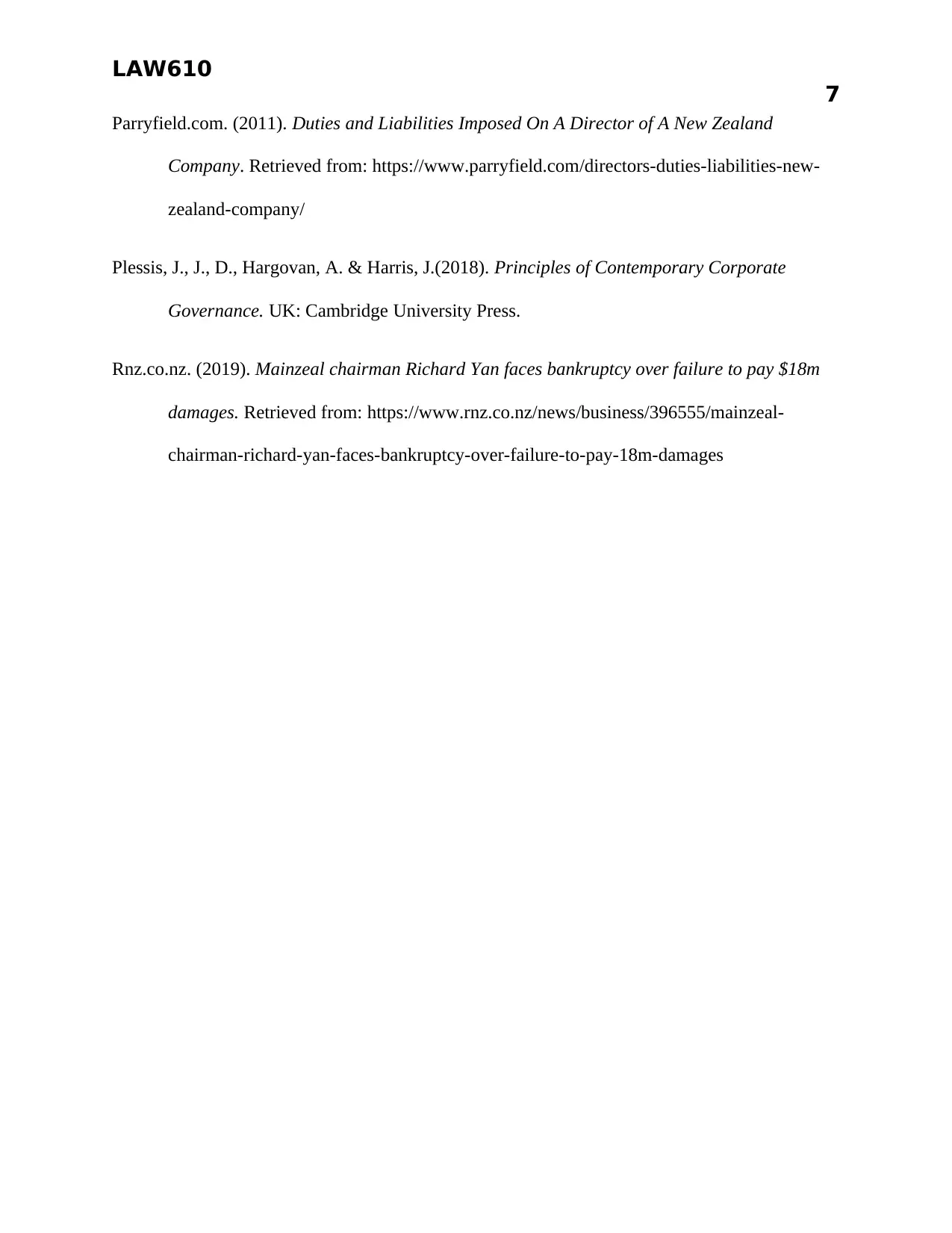
LAW610
7
Parryfield.com. (2011). Duties and Liabilities Imposed On A Director of A New Zealand
Company. Retrieved from: https://www.parryfield.com/directors-duties-liabilities-new-
zealand-company/
Plessis, J., J., D., Hargovan, A. & Harris, J.(2018). Principles of Contemporary Corporate
Governance. UK: Cambridge University Press.
Rnz.co.nz. (2019). Mainzeal chairman Richard Yan faces bankruptcy over failure to pay $18m
damages. Retrieved from: https://www.rnz.co.nz/news/business/396555/mainzeal-
chairman-richard-yan-faces-bankruptcy-over-failure-to-pay-18m-damages
7
Parryfield.com. (2011). Duties and Liabilities Imposed On A Director of A New Zealand
Company. Retrieved from: https://www.parryfield.com/directors-duties-liabilities-new-
zealand-company/
Plessis, J., J., D., Hargovan, A. & Harris, J.(2018). Principles of Contemporary Corporate
Governance. UK: Cambridge University Press.
Rnz.co.nz. (2019). Mainzeal chairman Richard Yan faces bankruptcy over failure to pay $18m
damages. Retrieved from: https://www.rnz.co.nz/news/business/396555/mainzeal-
chairman-richard-yan-faces-bankruptcy-over-failure-to-pay-18m-damages
1 out of 8
Related Documents
Your All-in-One AI-Powered Toolkit for Academic Success.
+13062052269
info@desklib.com
Available 24*7 on WhatsApp / Email
![[object Object]](/_next/static/media/star-bottom.7253800d.svg)
Unlock your academic potential
Copyright © 2020–2025 A2Z Services. All Rights Reserved. Developed and managed by ZUCOL.




